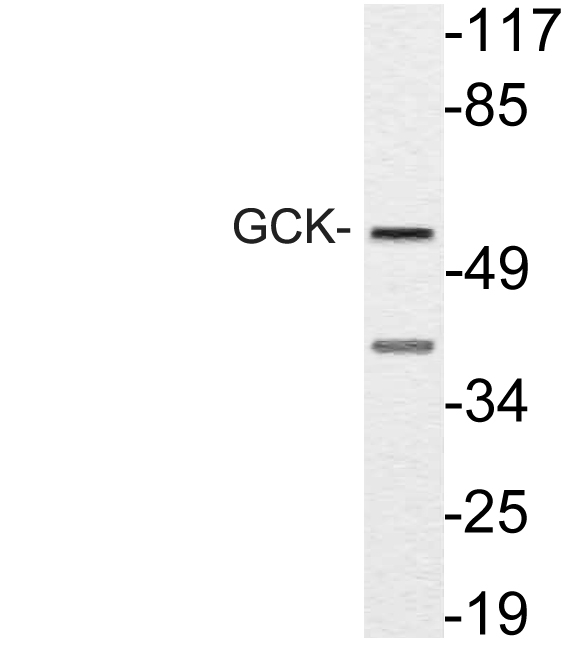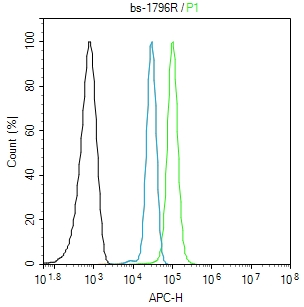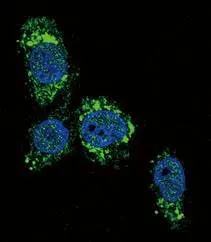![WB analysis of human GCK (AA: 1-198) recombinant protein using GTX60474 Glucokinase antibody [4G6]. WB analysis of human GCK (AA: 1-198) recombinant protein using GTX60474 Glucokinase antibody [4G6].](https://www.genetex.com/upload/website/prouct_img/normal/GTX60474/GTX60474_20170912_WB_1_w_23061123_147.webp)
WB analysis of human GCK (AA: 1-198) recombinant protein using GTX60474 Glucokinase antibody [4G6].
Glucokinase antibody [4G6]
GTX60474
ApplicationsWestern Blot, ELISA
Product group Antibodies
ReactivityHuman
TargetGCK
Overview
- SupplierGeneTex
- Product NameGlucokinase antibody [4G6]
- Delivery Days Customer9
- Application Supplier NoteWB: 1/500 - 1/2000. ELISA: 1/10000. *Optimal dilutions/concentrations should be determined by the researcher.Not tested in other applications.
- ApplicationsWestern Blot, ELISA
- CertificationResearch Use Only
- ClonalityMonoclonal
- Clone ID4G6
- ConjugateUnconjugated
- Gene ID2645
- Target nameGCK
- Target descriptionglucokinase
- Target synonymsFGQTL3, GK, GLK, HHF3, HK4, HKIV, HXKP, LGLK, MODY2, PNDM1, hexokinase-4, ATP:D-hexose 6-phosphotransferase, HK IV, glucokinase (hexokinase 4), hexokinase D, pancreatic isozyme, hexokinase type IV
- HostMouse
- IsotypeIgG1
- Protein IDP35557
- Protein NameHexokinase-4
- Scientific DescriptionHexokinases phosphorylate glucose to produce glucose-6-phosphate, the first step in most glucose metabolism pathways. Alternative splicing of this gene results in three tissue-specific forms of glucokinase, one found in pancreatic islet beta cells and two found in liver. The protein localizes to the outer membrane of mitochondria. In contrast to other forms of hexokinase, this enzyme is not inhibited by its product glucose-6-phosphate but remains active while glucose is abundant. Mutations in this gene have been associated with non-insulin dependent diabetes mellitus (NIDDM), maturity onset diabetes of the young, type 2 (MODY2) and persistent hyperinsulinemic hypoglycemia of infancy (PHHI). [provided by RefSeq, Apr 2009]
- ReactivityHuman
- Storage Instruction-20°C or -80°C,2°C to 8°C
- UNSPSC41116161

![WB analysis of HEK293 (1) and Glucokinase-hIgGFc transfected HEK293 (2) cell lysate using GTX60474 Glucokinase antibody [4G6]. WB analysis of HEK293 (1) and Glucokinase-hIgGFc transfected HEK293 (2) cell lysate using GTX60474 Glucokinase antibody [4G6].](https://www.genetex.com/upload/website/prouct_img/normal/GTX60474/GTX60474_20170912_WB_w_23061123_635.webp)
![ELISA analysis of antigen using GTX60474 Glucokinase antibody [4G6].
Red : Control antigen 100ng
Purple : Antigen 10ng
Green : Antigen 50ng
Blue : Antigen 100ng ELISA analysis of antigen using GTX60474 Glucokinase antibody [4G6].
Red : Control antigen 100ng
Purple : Antigen 10ng
Green : Antigen 50ng
Blue : Antigen 100ng](https://www.genetex.com/upload/website/prouct_img/normal/GTX60474/GTX60474_20170912_ELISA_w_23061123_892.webp)





![WB analysis of various sample lysates using GTX03171 Glucokinase antibody [GT1266]. Dilution : 1:1000 Loading : 25μg per lane](https://www.genetex.com/upload/website/prouct_img/normal/GTX03171/GTX03171_20210513_WB_w_23053123_794.webp)
![IHC-P analysis of human lung carcinoma tissue using GTX84440 Glucokinase antibody [3E3]. Antigen retrieval : Heat-induced epitope retrieval by 10mM citrate buffer, pH6.0, 100oC for 10min.](https://www.genetex.com/upload/website/prouct_img/normal/GTX84440/GTX84440_2711_IHC-P_w_23061420_556.webp)

